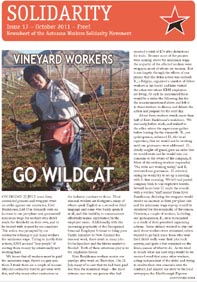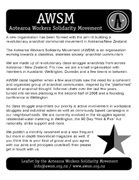Beneficiary bashing targets the sick
The new National government is set to attack beneficiaries with a complete overhaul of how the social welfare system operates in New Zealand. While most beneficiaries will be worse off under the new rules, two types of benefit are likely to be hit especially hard – those on what is currently known as the Sickness Benefit, and those on the Domestic Purposes Benefit.
Under the changes, the Sickness Benefit will be eliminated, and all those who currently receive it will be put instead on the new Jobseeker Support benefit. Under this, some beneficiaries may be able to get short-term ‘exemption certificates’ from the requirement to be actively looking for a job, but many will not. Those who are unable to prove that they are actively looking for a job will face sanctions, including cuts to their weekly income.
Under the current system, sickness beneficiaries are required to obtain a medical certificate (at their own cost) to show that they are unable to work. If you have one of these, WINZ will approve your application for the Sickness Benefit. In the new system, people will be forced to hand over their medical records to WINZ, and it is WINZ staff who will make the decision on whether or not you are capable of full or part time work. Beneficiaries will then be forced to make active attempts to find whatever level of work WINZ has decided you should be doing.
A similar system already exists in the UK. Mental health advocate group Mind produced a faux-tabloid called The Daily Stigma which examined the impacts of these policies. It included the following disturbing story:
“We deal with many people who have been told they are ‘fit for work’ under the new system despite experiencing serious mental health problems. The other day I was speaking to a man who has schizophrenia. He has it quite well under control, but still struggles with paranoia and can’t cope with much pressure.
He’s been found ‘fit for work’ so no has to look for work, but the anxiety caused by the assessment process and now the prospect of job hunting is really destabilising him. I’m very worried it’s going to push him back into severe illness, and last time that happened he ended up in hospital for two months. But what can we do? (benefits adviser)”
For people suffering from a mental illness, the added pressure to seek jobs (which often don’t exist, given our high unemployment) is likely to push many into worse health, potentially including hospitalisation and suicide. Many sufferers of depression, bipolar and other mental illnesses are especially vulnerable to changes in routine, added stress and time-constrained pressure. While they may be coping while on a benefit, the added stress relating to being forced into extra WINZ appointments, job applications and potentially job interviews could easily be enough to push them over the edge.
Beneficiaries are an easy target for governments looking for a scapegoat. They have little power in our society, and are frequently the first stop for a government looking to push hardline, conservative politics. We all need to support beneficiaries in the fight against this overhaul of the welfare system, to let them know that they aren’t alone. The fight against beneficiary bashing is a huge part of the overall fight against the austerity regime, which also includes public sector cuts, attacks on unions and cuts to services.
For more information, see:
Paula’s Benefits – http://bit.ly/tcyJWQ
The Daily Stigma – http://bit.ly/qqfIaF
Government factsheet on welfare reforms – http://bit.ly/vTtZ4h
 Download issue in .pdf format
Download issue in .pdf format



